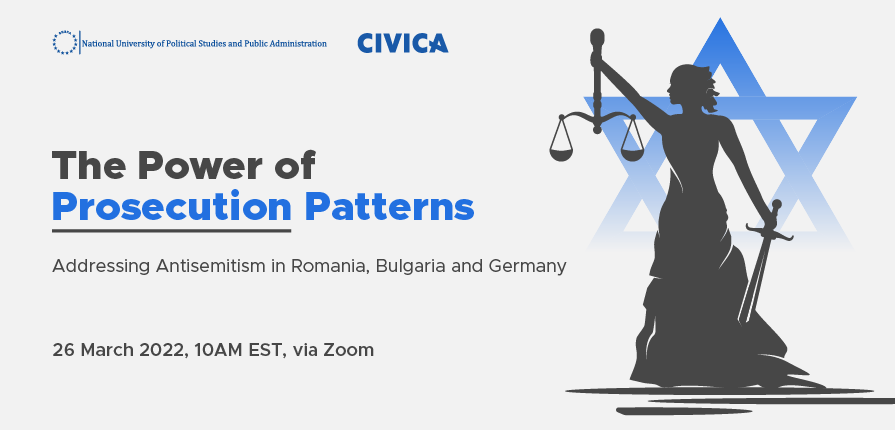This event will allow the research team to present the preliminary results of research and hear from a series of speakers from Romania, Bulgaria and Germany. The presentation will include a comparison of the legislative frameworks dedicated to fighting antisemitism in the three countries.
26 March 2022, 10:00 am EST/4:00 pm EET (Bucharest Time)
* Those who want to join the event will have to send an e-mail to silaw@snspa.ro.
The team of the research project “When the Law is Silent: Hate Crime Prosecution and Implicit Bias in Law Enforcement Agencies (SILAW)” – one of the winners of the CIVICA’s first call for collaborative research proposals – will present the preliminary results of research. We will also hear from a series of speakers from Romania, Bulgaria and Germany. The presentation will include a comparison of the legislative frameworks dedicated to fighting antisemitism in the three countries.
The collaborative research projects are funded from the European Union’s Horizon 2020 research and innovation programme, under the CIVICA Research project.
The aim is to identify possible links between law enforcement and the way anti-Semitism manifests itself in society, and shifts power relations. The project also includes an empirical study in Romania, involving conducting interviews with prosecutors, judges and police members, to test the hypothesis of a link between the implicit prejudices they would have and the application of the law in cases of anti-Semitism.
Opening remarks: H.E. Andrei Muraru, Ambassador of Romania to the United States
Moderator: Oana Mihalache, SILAW team member, PhD candidate
SILAW team members :
- Prof. Nadège Ragaru – Research Professor at Sciences Po Paris
- Prof. Constantin Iordachi – Professor of History at the Central European University, Vienna.
- Andreea Dobriță – PhD student in Sociology, SNSPA, Bucharest – research coordinator in Bucharest
Speakers:
• Alexandru Muraru, Member of Parliament and Special Representative of the Romanian Government for Promoting Memory Policies, Combating Antisemitism and Xenophobia.
• Michael Shafir, Professor, Doctoral School of International Relations and Strategic Studies, Faculty of History, Babeș-Bolyai University, Cluj-Napoca
• Daniel Poensgen, Scientific Advisor at the Federal Association of Departments for Research and Information on Antisemitism
• Krasimir Kanev, Chairperson, Bulgarski Helsinki Committee
• Jacob Comforty, writer, documentary film maker and oral historian. Author of “The Stolen Narrative of the Bulgarian Jews and the Holocaust”
• William Brustein, Special Assistant to the President for Global Affairs and Eberly Family Distinguished Professor of History, West Virginia University
• Marc Neugröschel, researcher and journalist, Hebrew University of Jerusalem
When the Law is Silent: Hate Crime Prosecution and Implicit Bias in Law Enforcement Agencies
This CIVICA Research project aims to investigate the prosecution of hate crimes in Romania, Bulgaria and Germany, with a specific focus on antisemitism, by looking into intrinsic motivations among the police and the judiciary. It also examines the structural patterns of implicit bias and the reasons why they remain silent and undetected – among country-wide surveys, and NGO or anti-discrimination groups and institutions’ activities.
The driving research questions are:
How does implicit bias among the police and the judiciary influence the judicial solutions to anti-Semitic and other hate crime cases?
What are the individual, institutional and societal factors that can account for a selection bias among law enforcement agencies?
How can patterns in the prosecution of cases involving hate crime influence the status of minorities, the relation between minority and majority groups and how do they reflect in the wider social and political order?
The aim of the project is to account for different ways in which implicit bias among the police and the judiciary can reveal either an undetected antisemitism or a spike in anti-Semitic violence. The main case study is represented by Romania, considering the period after 2015 to today. At the same time, by employing the method of asymmetrical comparison, the cases of Bulgaria and Germany will be considered as well.
One of the main objectives of the research is to first identify patterns of implicit bias among the judiciary and then assess their role in how individual files are legally instrumented. This will allow the team of researchers to examine the wider individual, institutional and societal markers that can account for bias and prejudice among law enforcement agencies and personnel.
Finally, the end results will be used to situate patterns of implicit bias into the wider matrix of the political order in Romania, Bulgaria and Germany, and formulate preliminary hypotheses for other European countries as well, by discussing issues of minority status and integration issues. In this way, the assesments will situate the research into the wider agenda of democratic backsliding literature and issues of social hierarchy, violence and oppression.
Researchers involved
- Dan-Andrei Muraru
- Nadège Ragaru
- Constantin Iordachi
- Oana-Cosmina Mihalache
Read more, here.



